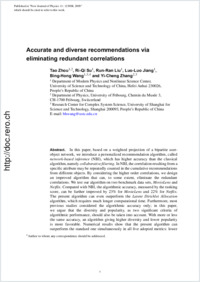Accurate and diverse recommendations via eliminating redundant correlations
- Zhou, Tao Department of Modern Physics and Nonlinear Science Center, University of Science and Technology of China, Hefei Anhui, China - Department of Physics, University of Fribourg, Switzerland
- Su, Ri-Qi Department of Modern Physics and Nonlinear Science Center, University of Science and Technology of China, Hefei Anhui, China
- Liu, Run-Ran Department of Modern Physics and Nonlinear Science Center, University of Science and Technology of China, Hefei Anhui, China
- Jiang, Luo-Luo Department of Modern Physics and Nonlinear Science Center, University of Science and Technology of China, Hefei Anhui, China
- Wang, Bing-Hong Department of Modern Physics and Nonlinear Science Center, University of Science and Technology of China, Hefei Anhui, China - Research Center for Complex System Science, University of Shanghai for Science and Technology, Shanghai, China
- Zhang, Yi-Cheng Department of Physics, University of Fribourg, Switzerland - Research Center for Complex System Science, University of Shanghai for Science and Technology, Shanghai, China
-
04.12.2009
Published in:
- New Journal of Physics. - 2009, vol. 11, p. 123008
English
In this paper, based on a weighted projection of a bipartite user-object network, we introduce a personalized recommendation algorithm, called network-based inference (NBI), which has higher accuracy than the classical algorithm, namely collaborative filtering. In NBI, the correlation resulting from a specific attribute may be repeatedly counted in the cumulative recommendations from different objects. By considering the higher order correlations, we design an improved algorithm that can, to some extent, eliminate the redundant correlations. We test our algorithm on two benchmark data sets, MovieLens and Netflix. Compared with NBI, the algorithmic accuracy, measured by the ranking score, can be further improved by 23 per cent for MovieLens and 22 per cent for Netflix. The present algorithm can even outperform the Latent Dirichlet Allocation algorithm, which requires much longer computational time. Furthermore, most previous studies considered the algorithmic accuracy only; in this paper, we argue that the diversity and popularity, as two significant criteria of algorithmic performance, should also be taken into account. With more or less the same accuracy, an algorithm giving higher diversity and lower popularity is more favorable. Numerical results show that the present algorithm can outperform the standard one simultaneously in all five adopted metrics: lower ranking score and higher precision for accuracy, larger Hamming distance and lower intra-similarity for diversity, as well as smaller average degree for popularity.
- Faculty
- Faculté des sciences et de médecine
- Department
- Département de Physique
- Language
-
- English
- Classification
- Physics
- License
-
License undefined
- Identifiers
-
- RERO DOC 17080
- DOI 10.1088/1367-2630/11/12/123008
- Persistent URL
- https://folia.unifr.ch/unifr/documents/301472
Statistics
Document views: 134
File downloads:
- pdf: 236
